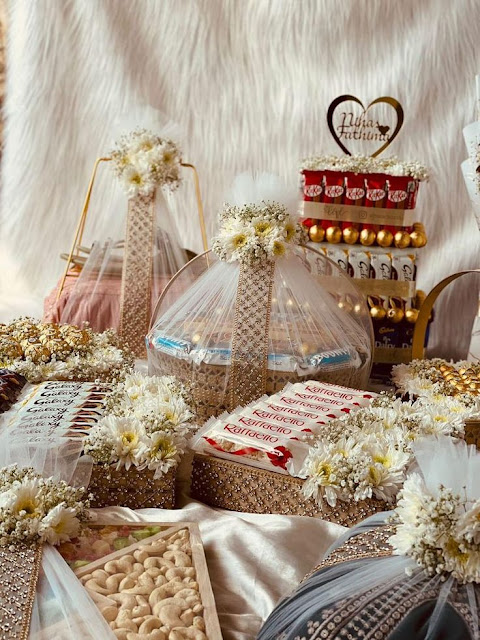.png) |
| Traditional Indian Engagement Gifts |
Hey everyone, Aarav here! Wedding season is in full swing, and one of the most exciting parts is celebrating engagements. Engagement ceremonies are a beautiful way to mark the beginning of a couple’s journey together. One key tradition during these ceremonies is the exchange of gifts between families. But what do these gifts really mean? Let's explore the wonderful world of traditional Indian engagement gifts!
1. Gifts as Blessings (Aashirwad in Disguise)
In Indian culture, gifts are not just material objects—they are symbols of blessings, love, and good wishes for the couple. When families exchange gifts during an engagement, they’re really sharing their hopes for a happy and prosperous life for the soon-to-be-married couple. This tradition helps strengthen the bond between the bride’s and groom’s families, uniting them as they prepare to become one big, happy family.
2. Gifts from the Groom’s Side (Special Surprises for the Bride)
Traditionally, the groom’s family brings gifts for the bride and her family. These gifts are chosen with care, each one holding a special meaning:
- Beautiful Sarees and Dress Materials: A saree or lehenga material is often given to the bride by the groom’s family. The bright colors and intricate designs represent a warm welcome into the groom’s family. These gifts also symbolize prosperity and the hope for a happy married life.
- Precious Jewelry: Gold and diamond jewelry are popular engagement gifts. They are not only beautiful but also signify a secure and prosperous future for the bride. Common jewelry gifts include bangles, necklaces, and earrings, each chosen according to the family's traditions.
- Delicious Sweets and Dry Fruits: Sweets, or mithai, and dry fruits are an essential part of any Indian celebration. When given as engagement gifts, they represent sweetness and the promise of a joyful journey ahead for the couple.
- Symbolic Fruits and Other Items: Fresh fruits like mangoes or coconuts often find their way into engagement gifts. These fruits symbolize fertility and abundance. Other symbolic items, like puja thalis (prayer plates) or diyas (lamps), represent blessings and a harmonious future together.
3. Gifts from the Bride’s Side (Thoughtful Gifts for the Groom)
The bride’s family also prepares special gifts for the groom and his family. These gifts reflect their acceptance of the groom into their lives and their hopes for his happiness:
- Traditional Clothes: A kurta-pyjama set or a sherwani is often gifted to the groom. This ensures that the groom looks his best on the wedding day and symbolizes the bride's family welcoming him with open arms.
- Elegant Watches or Cufflinks: A sophisticated watch or a set of cufflinks makes for a thoughtful gift. These items are not just stylish; they also symbolize punctuality, responsibility, and a successful future.
- Sweets and Dry Fruits: Just like the groom’s family, the bride’s family also gives sweets and dry fruits. These gifts add to the festive spirit and shower the couple with even more blessings.
- Cash (Shagun): In some Indian regions, it’s customary to give cash, known as Shagun, during the engagement. This practical gift helps the couple prepare financially for their future together, showing the families' support for their new journey.
4. Choosing the Perfect Gift
When selecting gifts for an Indian engagement, it’s important to choose items that are meaningful and come from the heart. Whether it’s a piece of jewelry, a traditional outfit, or a simple sweet treat, the best gifts are those that reflect love, care, and good wishes for the couple.
Conclusion
Engagement gifts in Indian culture are more than just presents—they are a way to express blessings, love, and the hope for a bright future. By understanding the meaning behind these traditional gifts, you can participate in this beautiful custom and help celebrate the joy of love and togetherness.








.jfif)
.jfif)
.jfif)

.jfif)



.png)
.jpg)

0 Comments